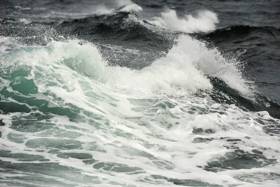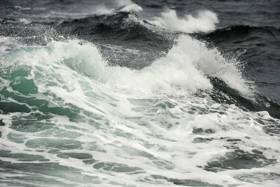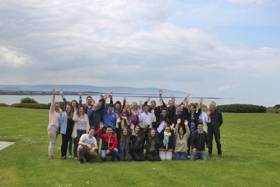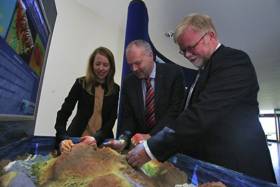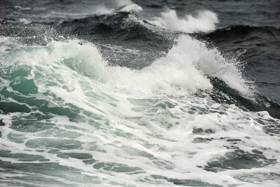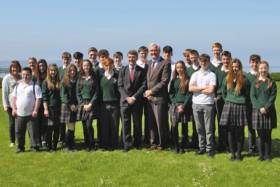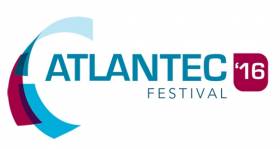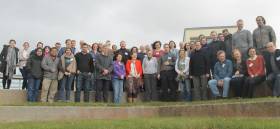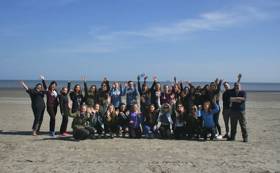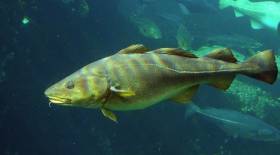Displaying items by tag: Marine Institute
#SeaPower - The public consultation period for the Marine Institute’s foreshore lease application to upgrade the Galway Bay Marine and Renewable Energy Test Site has been extended once more, until 5pm on Friday 9 September.
This latest extension follows the public meeting on Thursday 21 July in the Connemara Coast Hotel, during which some participants requested more time to allow informed submissions on the lease application.
It also comes after complaints from Galway West TD Catherine Connolly over a lack of response from Local Government Minister Simon Coveney over the issue, as the Galway Advertiser reports.
The meeting was the third public meeting held as part of the consultation on the foreshore lease application to upgrade test and demonstration facilities at the Galway Bay Marine and Renewable Energy Test Site.
The Marine Institute applied in April to the then Department of the Environment, Community and Local Government for a foreshore lease for the site where prototype marine renewable energy technology can be tested at reduced scale to determine viability in an ocean environment.
All relevant documents remain on viewing until the new deadline.
Some 25 submissions have been received as of the previous deadline of 2 August, according to Galway Bay FM.
Public Meeting In Connemara On Galway Bay Marine Test Site
#SeaPower - The Marine Institute will host a third public information meeting on the Galway Bay Marine and Renewable Energy Test Site next Thursday 21 July at 7:30pm in the Connemara Coast Hotel in Furbo, Co Galway.
The meeting is part of the public consultation to ensure full information is provided on the Marine Institute’s foreshore lease application to upgrade test and demonstration facilities at the Galway Bay Marine and Renewable Energy Test Site.
The Marine Institute and the Sustainable Energy Authority of Ireland will provide information on the background to the lease application and the scope of the proposed upgrade and address questions raised by the public ahead of the new deadline for submissions, which is Tuesday 2 August.
As previously reported on Afloat.ie, the application document and relevant maps, plans reports and drawings are available from the Department of the Environment's website, and are also available for viewing in Salthill and Spiddal till the deadline. Information on the consultation is also available in Irish.
Marine Institute Summer Bursar Programme Returns
#MarineInstitute - The annual Marine Institute bursar programme begins this month with 28 students from various third-level institutions starting summer work placements.
Over eight weeks, the students will work in a variety of areas including salmon assessments, fish sampling at the ports, shellfish assessment, maritime economics, education, application development and oceanographic sciences.
"The work experience programme gives students from a wide variety of disciplines a chance to further their knowledge and research in their particular area of interest and to expand their professional networks within Ireland and internationally," said Helen McCormick, senior laboratory analyst at the Marine Institute and co-ordinator of the bursar programme.
As previously reported on Afloat.ie, the placements will give students practical and hands-on experience at different locations around Ireland, including the offices and laboratories at the Marine Institute, Galway; Wilton Place, Dublin; and Burrishoole Catchment, Newport, Co Mayo. Some students will also be located at other locations around the country in counties Cork, Limerick, Derry and Waterford.
The summer bursar programme has been ongoing since the 1960s and is a highly sought-after work experience programme in the marine science sector and continues to offer a promising gateway into the expanding areas of marine science and research in Ireland.
Dr Peter Heffernan, CEO of the Marine Institute, congratulated all successful bursars on this year's programme. "The Institute is delighted to support this excellent learning opportunity for Irish students as well as highlight the future employment opportunities for undergraduates and postgraduates within the marine sector," he said.
#OurOceanWealth - Industry leaders, policy makers, researchers and maritime entrepreneurs will come together for the third Our Ocean Wealth conference on Friday 1 July in NUIG to discuss marine innovation, marine spatial planning, healthy ocean ecosystems and sustainability, the Marine Institute announced today (Tuesday 7 June).
The theme of this year's conference is 'Into the Blue – Innovating for our Marine Future', and key speakers include Vice Admiral Mark Mellett, head of the Irish Defence Forces; European Commission director general and research head of marine resources Sigi Gruber; Gerald Fleming of Met Éireann; Craig McLean of the US National Ocean & Atmospheric Administration; and Linda Rosborough of Marine Scotland.
New Marine Minister Micheal Creed will also give his first formal address on the marine economy at the conference.
"This conference will be an opportunity to reflect on the progress and achievements in implementing Harnessing Our Ocean Wealth – An Integrated Marine Plan for Ireland," he said. "I'm looking forward to hearing from thought leaders and innovators across a broad and exciting maritime sphere and to join the discussion on innovating for our marine future."
Speaking at the launch of the conference schedule, Marine Institute CEO Dr Peter Heffernan said: "While there are many events internationally that look at specific areas of our marine economy, from shipping and transport to energy, the Our Ocean Wealth annual conference is unique in that it brings global experts in this industry together to discuss the future opportunities and challenges for the blue economy.
"This holistic approach to the global maritime economy, and our focus on Ireland's blue economy, makes it a must-attend event for anyone working in or involved in marine-related activities."
Delegates will also hear from Irish companies leading in innovation such as OpenHydro Group Ltd, which has just installed its second tidal turbine off the north west coast of France due to connect to the grid this summer, in what will be a world first for the tidal energy industry.
Several hundred people are expected to attend the Our Ocean Wealth conference, which is being held in Galway this year as part of SeaFest, Ireland's national maritime festival, from 30 June to 3 July.
A number of other blue economy events are also taking place to coincide with the conference, including a Sea Change Researchers Workshop at the Marine Institute, the Digital Ocean event at the Meyrick Hotel and the BIM National Seafood Conference which all take place on Thursday 30 June.
#SeaPower - A public consultation is underway on the Marine Institute’s application for a foreshore lease to upgrade the Galway Bay Marine and Renewable Energy Test Site.
The Marine Institute has applied to the Department of the Environment, Community and Local Government for a foreshore lease for the site where prototype marine renewable energy technology can be tested at reduced scale to determine viability in an ocean environment.
Observations are invited on the foreshore lease application, which outlines plans to upgrade the current infrastructure and facilitate the deployment of a wider range of marine renewable energy devices and novel sensor technologies at the test site.
The Galway Bay Marine and Renewable Energy Test Site has been in operation since 2006 when it was established by the Marine Institute and the Sustainable Energy Authority of Ireland. The purpose of the site is to allow marine technology innovators to test the viability of small scale prototypes in an ocean environment.
A copy of the application and relevant maps, plans, reports and drawings are available to download HERE from the Department of the Environment, Community and Local Government’s website.
Copies of these documents are also available for viewing at Salthill Garda Station, Spiddal Public Library and Comhlacht Forbartha An Spideal Teo until 5pm on Friday 17 June.
Should you wish to make a submission on the lease applications you should do so in writing, giving reasons, within 21 working days of publication of this Notice (Friday 20 May), quoting ref FS 006566, to the Foreshore Unit, Department of the Environment, Community and Local Government, Newtown Road, Wexford or [email protected]. The closing date for submissions is close of business on Friday 17 June.
The Marine Institute plans to hold a public information evening in early June as part of the consultation process, details of which will be announced in due course.
For further information please contact Alan Berry at [email protected]
#MarineInstitute - Canadian Ambassador to Ireland Kevin Vickers visited the Marine Institute in Oranmore this week to hear about the ongoing marine science and research collaborations between the Ireland and Canada.
These include a survey on the Celtic Explorer, which left St John's in Newfoundland last Wednesday 11 May with scientists from Ireland, Canada and the USA onboard to map a transect of the Atlantic seabed.
Ambassador Vickers also had the opportunity to meet local Transition Year students from Calasanctius Secondary School who were visiting the Marine Institute to learn about marine research, potential career opportunities and to promote ocean literacy. He talked to them about the longstanding links between Ireland and Newfoundland.
Marine Institute chief executive Dr Peter Heffernan commented: "Co-operation between our nations is key to improving our ocean wealth and promoting the sustainable management of its resources. It's hugely important for Ireland and brings us closer to achieving the goals of the Galway Statement on Atlantic Ocean Cooperation signed here at the Marine Institute Galway in May 2013 by the EU, USA and Canada.
"The current survey on the Celtic Explorer is called TRASNA [the Irish word for crossing] and is the fourth seabed mapping survey to take place under the Atlantic Ocean Research Alliance," he added.
The Marine Institute is leading the Horizon 2020 funded project, the Atlantic Ocean Research Alliance Co-ordination and Support Action, to support the implementation of the Galway Statement.
Meanwhile, the visiting TY students were given an overview of the wide-ranging research areas within the institute by Dr Paul Connolly, director of fisheries ecosystems and advisory services.
The students toured the fish aging laboratories to learn how scientists use the otolith, or earbone, of a fish to discover its age and how this process is used for assessing fish stocks so that we know the sustainable limits for fishing.
They also learned about ocean acidification and how climate change is being affected by the increase of CO2 in our oceans with talk by Dr Triona McGrath.
The INFOMAR team demonstrated their work on seabed mapping using the latest technology, explaining the importance of topography, geology and seabed mapping using Ireland's first augmented reality sandbox.
#AtlanTec - As part of the 2016 AtlanTec technology festival, the Marine Institute is hosting an in-company event next Wednesday 18 May at 1pm in Oranmore to give an insight into how ICT is being used to support marine research and development in Ireland. Click HERE for booking info.
The AtlanTec festival runs over two weeks from 16-29 May and consists of a series of wide-ranging information technology themed events, of interest to IT industry professionals, community groups and those in education.
The purpose of AtlanTec is to showcase Galway’s diverse technology culture and to encourage creativity, innovation and collaboration within the IT, business and educational communities in the West of Ireland. For details visit the AtlanTec website HERE.
Marine Institute Hosts Ocean Explorers at Oranmore
The Marine Institute held the second bi-annual research vessel users conference today at its headquarters in Oranmore, Galway to discuss the vast range of capabilities of both the RV Celtic Explorer and RV Celtic Voyager after their 2015 refits, as well as the use of the remotely operated vehicle, ROV Holland 1.
Director Mick Gillooly of Ocean Science and Information Services, Marine Institute, welcomed the attendance of over 70 marine scientists and researchers who will go to sea on the national research vessels this year. He said: “The demand for survey time on the national research vessels and the quality marine research being carried out across the country shows that Ireland’s scientists are answering the call to better understand our oceans.”
“At a time when we can all see the impacts of climate change, it’s more important than ever to carry out research at sea, including oceanography, fisheries, and environmental monitoring.”
The conference provided information about using high resolution multi-beam mapping, the capabilities of the ROV Holland 1 on surveys as well as key speaker’s experiences using the equipment.
Dr Florian Le Pape of the Dublin Institute for Advanced Studies (DIAS) spoke about the deployment of an Ocean Bottom Seismometer (OBS) network off the Irish shelf as far as the Rockall Trough. Dr Le Pape recently deployed 10 Broad Band OBSs from the RV Celtic Explorer as part of an innovative research program between DIAS, the Helmholtz Centre GFZ Potsdam, Germany and instruments provided by the Alfred Wegener Institute, Germany, which uses the noise from ocean waves to generate seismic images of the earth’s crust.
Over 70 marine scientists attended the Research Vessel Users Conference at the Marine Institute. Deep sea mud volcanoes off the gulf of Cadiz and the high resolution multi-beam mapping of World War 1 shipwrecks in the Irish Sea highlighted the advanced capabilities of the research vessels for deep sea exploration.
The workshop was organised by the Marine Institute’s research vessel operations team also highlighted the value of ship time. Mr Aodhan Fitzgerald, Research Vessel Operations Manager, spoke about the future vessel availability, the ship-time competition for 2017, and how to prepare a strong research survey proposal.
The Marine Institute’s ship-time programme will provide €3 million funding in 2016 supporting 256 research days onboard the national research vessels, RV Celtic Explorer and RV Celtic Voyager. The programme gives researchers access to the national research vessels, as well as the remotely operated submarine ROV Holland I to carry out surveys that further our understanding of the ocean, support policy and development, as well as providing essential training to young researchers and undergraduates.
The programme is part of a busy schedule of research vessel programmes that includes statutory fish stock assessment, environmental monitoring, and seabed mapping surveys in Irish Waters and across the Atlantic basin to Newfoundland.
You can follow the surveys of the research vessels on the blog http://scientistsatsea.blogspot.ie where scientist on-board the national research vessels blog about their research at sea
Bringing The Ocean Into The Classroom
#MarineScience - Dublin City University's St Patrick's Campus and the Marine Institute ran a pilot marine module with over 40 student teachers this week, giving them an opportunity to learn about teaching marine science and Ireland’s marine heritage.
Marine Institute chief executive Dr Peter Heffernan welcomed the collaboration with DCU to introduce themes relating to the marine environment into the science module.
“We recognise the unique position teachers have to help students develop an understanding of our amazing ocean resources," he said. "We hope these teachers will inspire curiosity among their students to learn more about the ocean and to develop an understanding of how we influence the ocean and how the ocean influences us.”
With a focus on a 'Marine Day' on 20 April on campus and in and the wider university, the oceans, seas and shorelines around Ireland present many opportunities to introduce marine themes into a range of cross curricular lessons,” explained Dr Thomas McCloughlin lecturer and lab manager of science at DCU's St Patricks Campus.
The Marine Institute provided a saltwater aquarium as well as a tidal tank for the modules, showing how bringing the seashore to the class provides an exciting way to learn about marine animals typically found on the seashore.
The programme was delivered to over 40 second- and third-year student teachers and included a field trip to the seashore and a range of interactive presentations in class.
“Student teachers get to explore the seashore through field trips as well as analysing specimens through examination and dissection in class. This allows them to integrate examining the biological themes of the marine as well as introducing social, physical-human and geographical influences relating to understanding and ocean resource,” said Dr Noirin Burke of the Galway Atlantaquaria, representing the Marine Institute’s primary school Explorers Education Programme.
Ireland has a seabed territory of approximately 880,000 sq km, 10 times greater than the size of the island of Ireland, making this one of the largest maritime member states of the European Union.
“Therefore, with Ireland being responsible for such a significant ocean resource, it is considered fundamental to teach Irish children, particularly as we are an Island nation, the historical and cultural values as well as the geographical and scientific backgrounds of our marine environment,” said Cushla Dromgool-Regan, responsible for the strategic development of education at the Marine Institute.
The pilot is supported by the Marine Institute and the Explorers Education Programme, which aims to build on Ireland’s marine and maritime heritage by increasing awareness of the value, opportunities and social benefits of our ocean wealth and identity.
The pilot was supported by Explorer Education Centres, Galway Atlantaquaria, Blackrock Education Centre and Sea Life Bray. For more information about the Explorers Education Programme see www.explorers.ie.
#PublicLecture - 'The Little Ice Age and the North Atlantic Fish Revolution' is the title of a public lecture delivered by Prof Poul Holm and Dr Francis Ludlow of Trinity College Dublin at lunchtime this Wednesday 13 April at the Marine Institute headquarters in Oranmore, Co Galway.
Holm is Professor of Environmental History at the School of Histories and Humanities in TCD. In 2015 he was awarded an Advanced Grant of €2.5 million by the European Research Council. In the next five years he and his team will explore the North Atlantic 'fish revolution' circa 1400-1700 AD.
In 1497, John Cabot returned to Bristol from a voyage across the North Atlantic. He told of waters so thick with fish that they could be lifted straight on board in baskets. Within a few years of this journey, fishermen from all over Western Europe made the journey across. This was the beginning of the 'fish revolution' of the early-modern world.
The fish revolution was one of the first examples of the disrupting effects of globalisation and climate change. Fish was a high-priced, limited resource in the Late Middle Ages. The Grand Banks fishery offered abundant high-quality low-priced catches to the European market. At the same time climate worsened as the Little Ice Age drove down sea temperatures and changed marine ecosystems.
The consequences were dire for fishermen along the coasts from the Irish Sea right up to northern Norway. As they caught less cod locally at higher prices, the fishermen had the choice of migrating across the ocean or give up fishing. Many fishing settlements were deserted as inhabitants took to the road to seek casual work in agriculture or towns.
Kings and high politics were similarly affected by the fish revolution. The new resource held strategic importance for all major western European powers, such as Spain, Britain and France. North Atlantic warfare was about fish as well as about gold.
In recent years we have all been affected by the impact of global change. We want to know if we can untangle the drivers of prices and temperatures to explain the causes of the fish revolution, and we want to know how people understood and responded to the challenges of globalisation and climate change. The lecture posits that perhaps the fish revolution of the Middle Ages is a distant mirror for today.
All are welcome to the event at the Marine Institute Auditorium this Wednesday at 12 noon.



























